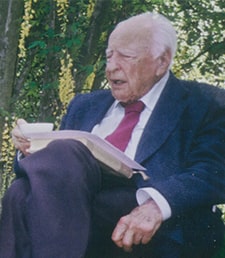Hans-Georg Gadamer (1900 – 2002) is one of the most influential thinkers in twentieth century hermeneutics, with a reputation that surpasses that of other prominent figures, such as Paul Ricoeur and Gianni Vattimo. Gadamer was deeply influenced by the philosophy of Martin Heidegger and also trained in neo-Kantian and classical philology.
Gadamer began his university studies in Breslau in 1918, moving to Marburg with his father in 1919. There, he studied with renowned humanistic scholar, Richard Hoenigswald. Gadamer completed his doctoral studies at Marburg in 1922, achieving distinction with a dissertation on Plato.
Paul Friedlander introduced him to the study of philology, and Gadamer also received encouragement from Rudolf Bultmann. Martin Heidegger had a profound impact on Gadamer’s philosophical development at Marburg University from 1923 to 1928. Gadamer first met Heidegger in Freiburg in early 1923 and corresponded with him in 1922. Although Gadamer was a key figure in Heidegger’s Marburg circle, working as Heidegger’s unpaid assistant, by 1925 Heidegger had come to view Gadamer’s philosophical capacities and contributions as less than optimal. As a result, Gadamer decided to abandon philosophy for classical philology. Gadamer’s work in philology led to his gaining Heidegger’s respect once again. In 1927, he passed the State Examination in Classical Philology, with Friedlander and Heidegger as the examiners. In 1928, he submitted his habilitation dissertation, “Plato’s Dialectical Ethics,” under Friedlander and Heidegger’s guidance.
Gadamer was first appointed to a junior position at Marburg University in 1928. He finally achieved a lower-level professorship there in 1937. Gadamer held a temporary professorship at Kiel in 1934 and 1935, and then took up the Directorship of the Philosophical Institute at the University of Leipzig in 1939. In 1945 he became Dean of the Faculty, and Rector in 1946. He returned to teaching and research at Frankfurt-am-Main in 1947. Gadamer held a temporary professorship at Kiel from 1934 to 1935 and then, in 1939, took up the Directorship of the Philosophical Institute at the University of Leipzig. He became Dean of the Faculty in 1945 and Rector in 1946 before returning to teaching and research at Frankfurt-am-Main in 1947.
In 1953, together with Helmut Kuhn, Gadamer founded the highly influential Philosophische Rundschau, but his main philosophical impact was not felt until the publication of Truth and Method in 1960.
Gadamer’s later work is more well-known than his earlier work, because it came after he developed his famous theory on truth, and also because he stopped teaching full-time in the years leading up to it. Gadamer died on March 13, 2002, at the age of 102.


